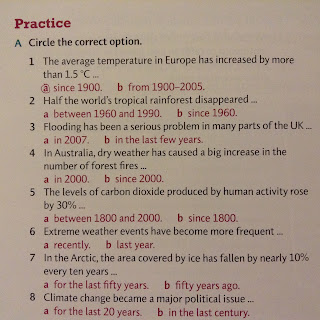Complete the text by writing one word in each gap. Make sure that you spell the word correctly.
"Complete First for Schools" page 13 exercise 4.
To be submitted in the 4th class of the week (last class)
Wednesday, 7 September 2016
Tuesday, 6 September 2016
English Language 3rd Grade
Notebook teams
Make up your team. Remember you choose who to work with. This is teamwork hence every team member is responsible for the performance of each member. There are no pop checks so you will have time to revise your notebooks. One per team of 4 or 5 members.
STUDENT’S NAME and LIST NUMBER
1. ________________________________________ ________
2. ________________________________________ ________
3. ________________________________________ ________
4. ________________________________________ ________
5. ________________________________________ ________
1st
Bimonthly Period
|
2nd
Bimonthly Period
|
3rd Bimonthly Period
|
4th
Bimonthly Period
|
5th
Bimonthly Period
| |
Student’s name
Over 10
| |||||
Student’s name
Over 9
| |||||
Student’s name
Over 8
|
Monday, 5 September 2016
Present Perfect Simple vs Continuous
|
Present Perfect Simple
|
Present Perfect Continuous (Progressive)
|
|
I, you, we, they+have+past participle
|
I, you, we, they+have+been+verb (ing)
|
|
He, she, it+has+past participle
|
He, she, it+has+been+verb (ing)
|
|
emphasises the result:
I’ve phoned all my friends and they’re coming to the party.
|
emphasises the action: I’ve been phoning my friends (and that’s why I haven´t done my homework)
|
|
says how much of an activity is complete:
I’ve written two essays.
|
Says how long the activity has been in progress:
I’ve been studying all afternoon.
|
|
Present Perfect Simple
|
Present Perfect Continuous (Progressive)
|
|
may give the idea that something is permanent (and may be accompanied by a time expression which shows this): My dad has worked in the same shop all his life. I´ve always lived here.
|
may give the idea that something is temporary (and may be accompanied by a time expression which shows this): I’ve been working here for the last two months. We’ve been eating dinner in the garden during the warm weather.
|
|
is used when we want to say how many times an action has been repeated: I’ve invited her two or three times, but she always says she’s busy.
|
when we want to emphasise the process of change over a period of time and that these changes are not finished: My teacher says my English has been improving since I started doing my homework.
|
Subscribe to:
Comments (Atom)


